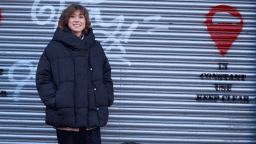
Holly launched Selextorhood (SLX) in January 2019 so that womxn and non-binary people could learn the art of DJing in a safe and welcoming community.
What was the business problem/opportunity you were trying to solve?
At a local/personal level, I was working at [café, record shop and art space] Cafe Artum and wanted to see more womxn using the shop/buying records, and to see more non-male names on Brum’s club night line-ups. In the wider context, every other major city in the UK had their own ‘DJ girl gang’ to fight the blatant inequality in the music industry, so I wanted to create Birmingham’s version.
How did you do this? Has it worked and what would you recommend to others in your position?
It has worked, and a lot faster than I had imagined - we have a core community of 25 DJs in 18 months.
I’d definitely recommend starting something yourself if you see a gap in the market and have the time, passion and dedication to fulfil the demand. To be honest, when SLX launched I had no idea the demand in Brum would be so high, but am glad it’s there and I’m able to continue working on it. If you don’t want go down the DIY route, I'd definitely recommend joining a DJ community in your area, it’s so helpful for troubleshooting technicalities, growing your reach and having understanding, like-minded people around you.
How important were under 25s in addressing this?
Very - SLX wouldn’t exists without under 25s. Initially I was speaking to my girlfriends about the idea: we’re all 1994/95 babies so have witnessed many societal injustices play out, plus having grown up with the internet, we've always been able to connect and educate ourselves. The collectively understood feeling of seeing a femxle face behind the decks at festivals was something I couldn’t ignore.
The support from students and young people has been immense, with many people I’ve spoken to searching for the same sense of belonging. However, I do think that it’s very important to have a variety of ages, voices and backgrounds in order for us to move forward together, with the most knowledge.
Has it changed the way your organisation works? If so, how?
As an organisation I definitely think because of the young, open, mindsets involved we’re very inclusive and aware of injustices and are not afraid to have difficult conversations, to make mistakes and learn from each other. Everything we do is rooted in generational change, so I feel as a community we are on the right track and are able to keep moving forwards, instead of having to realign or rectify outdated structures.
What has it been liking working with young people? What advice would you have for other organisations looking to do the same?
Easy, fun! Young people are fed-up with the world we’ve been brought into, we no longer stand for the same things generations before us have - in fact we’re actively changing them. Young people know more than you might think - not just about social media - and listening to them will show you a more balanced and rounded view of the world. They can help you see what’s important to them and aren’t afraid of telling you what they think. They’re concerned for their children and the planet and will do anything in their power to help.
